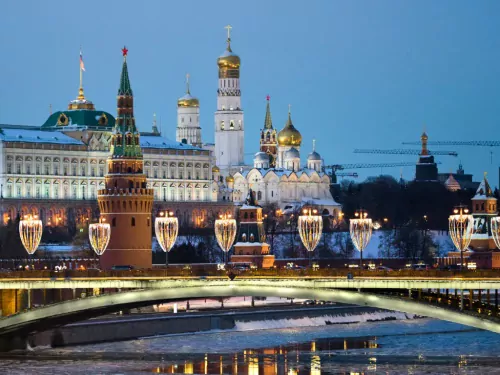
Russia is the world's largest country by land area, with a population of over 144 million people. Despite its vast natural resources and potential for economic growth, Russia has faced numerous business problems over the years. In this blog post, we'll take a look at some of the most common business problems in Russia and explore their underlying causes.
Corruption
Corruption is a pervasive problem in Russia that affects both large and small businesses. Bribery, kickbacks, and other forms of corruption are rampant, and it can be difficult to do business in Russia without engaging in such practices. This not only creates ethical dilemmas for business owners, but it also makes it difficult for businesses to compete fairly in the market.
Corruption is one of the most significant business problems in Russia. It is pervasive across all levels of society and has been a longstanding issue in the country. Corruption can take many forms, including bribery, embezzlement, fraud, and abuse of power. It can have a profound impact on businesses in Russia, as it can make it challenging to operate in a fair and transparent market.
One of the reasons why corruption is so prevalent in Russia is due to the country's history and political system. During the Soviet era, corruption was rampant, and many people learned how to navigate the system through bribes and other forms of illicit activity. This culture of corruption persisted after the fall of the Soviet Union, and the transition to a market economy only exacerbated the problem.
Another reason why corruption is so prevalent in Russia is the lack of effective institutions to combat it. While there are laws and regulations in place to prevent corruption, they are often not enforced effectively. Additionally, the judiciary system can be slow and corrupt itself, which can make it difficult for businesses to seek justice when they have been wronged.
Corruption can have a wide range of negative impacts on businesses in Russia. It can increase the cost of doing business, as companies may need to pay bribes or engage in other corrupt practices to operate effectively. It can also limit competition, as companies that are unwilling or unable to engage in corruption may be at a disadvantage. Furthermore, corruption can erode public trust in the business sector, which can harm the overall reputation of Russian businesses both domestically and internationally.
Addressing corruption in Russia will require a concerted effort from both the government and the private sector. The government must take a strong stance against corruption, enforce laws and regulations more effectively, and create institutions that can combat corruption effectively. Additionally, the private sector must work to promote transparency and accountability in their operations and resist engaging in corrupt practices. By addressing corruption in Russia, businesses can operate in a more fair and transparent market, which can ultimately lead to greater prosperity for all.
Bureaucracy
Russia's bureaucracy is notoriously complex and cumbersome, with a plethora of regulations and red tape that can make it difficult to start or run a business. Obtaining permits, licenses, and other necessary documents can be time-consuming and frustrating, which can deter potential investors and entrepreneurs.
Political Instability
Russia's political situation has been unstable for many years, with frequent changes in leadership and uncertain policies. This can create an unpredictable business environment, as businesses may not know what to expect in terms of regulations, taxes, and other factors.
Weak Infrastructure
Russia's infrastructure is underdeveloped in many areas, which can create significant challenges for businesses. Poor roads, inadequate public transportation, and limited access to high-speed internet are just a few examples of the infrastructure problems that can hinder business operations.
Weak infrastructure is another significant business problem in Russia that can hinder economic growth and development. Russia's infrastructure is underdeveloped in many areas, including transportation, telecommunications, and energy. This can create challenges for businesses operating in the country, as they may face difficulties transporting goods and accessing essential resources.
One of the reasons why Russia's infrastructure is weak is due to historical factors. During the Soviet era, the government prioritized heavy industry and military spending over infrastructure development. This led to a neglect of infrastructure investments, which has persisted to this day.
Another reason why Russia's infrastructure is weak is due to the country's vast size and challenging geography. Russia spans 11 time zones and has a diverse range of terrain, from dense forests to frozen tundra. This can make it challenging and expensive to build and maintain infrastructure, especially in remote areas.
The weak infrastructure in Russia can have significant negative impacts on businesses. For example, poor road conditions can increase transportation costs and cause delays in delivering goods. Limited access to high-speed internet can make it challenging for businesses to communicate effectively with customers and partners. Inadequate energy infrastructure can lead to power outages and disrupt business operations.
Addressing the infrastructure problem in Russia will require significant investments and reforms from both the government and the private sector. The government must prioritize infrastructure development, invest in modernizing and maintaining existing infrastructure, and create incentives for private investment in infrastructure projects. Additionally, businesses can work to adapt their operations to the existing infrastructure and invest in technologies that can mitigate the impact of weak infrastructure, such as remote monitoring and automation. By addressing the infrastructure problem in Russia, businesses can operate more efficiently and effectively, which can lead to greater competitiveness and economic growth.
Economic Sanctions
Russia has faced economic sanctions from the United States and other countries in recent years, which has had a significant impact on businesses operating in Russia. These sanctions have restricted access to international markets, increased the cost of doing business, and limited the availability of resources.
Limited Access to Financing
Access to financing is a challenge for many businesses in Russia, particularly small and medium-sized enterprises (SMEs). Banks and other financial institutions may be reluctant to lend to businesses without a track record of success or sufficient collateral, which can limit the growth potential of these businesses.
In conclusion, Russia faces a range of business problems that can make it difficult for companies to succeed in the country. Addressing these issues will require a concerted effort from both the government and the private sector, but it is essential for the long-term growth and prosperity of Russia's economy.








